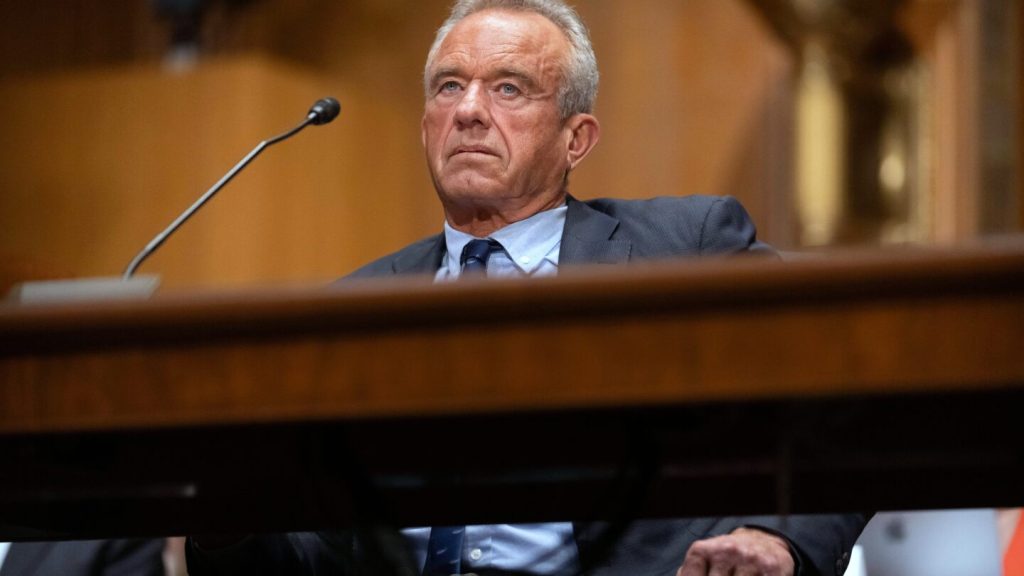Listen to the article
Kennedy Makes False Claims on COVID-19, Vaccines During Senate Hearing
U.S. Health Secretary Robert F. Kennedy Jr. faced intense scrutiny during a contentious three-hour Senate Finance Committee hearing on Thursday, where he made numerous false and misleading claims while defending his seven-month tenure leading the nation’s health agencies.
Throughout the hearing, Kennedy contradicted established scientific evidence, mischaracterized legislation, and presented unsubstantiated information on topics ranging from COVID-19 vaccines and mortality data to rural hospital funding and mental health medication.
When questioned about COVID-19 vaccine efficacy by Senator Maggie Hassan, Kennedy claimed, “The only confusion I expressed is exactly how many lives were saved. I don’t think anybody knows that.” This statement contradicts extensive peer-reviewed research documenting vaccine effectiveness.
A 2024 World Health Organization study found COVID-19 vaccines reduced deaths in Europe by at least 57%, saving more than 1.4 million lives since their introduction in December 2020. Similarly, a 2022 study published in the Lancet Infectious Diseases estimated that nearly 20 million lives were saved globally during vaccines’ first year, including 1.9 million in the United States alone.
Current CDC data shows the 2024-2025 COVID-19 vaccine is 33% effective against emergency department visits for adults over 18 and 45-46% effective against hospitalizations among immunocompetent adults 65 and older compared to unvaccinated individuals.
Kennedy also made misleading statements about COVID-19 booster shot availability, suggesting “anybody can get the booster.” In reality, the Food and Drug Administration has approved updated COVID-19 shots only for seniors and younger people with underlying health risks. Availability varies significantly by state, with many pharmacies legally barred from administering vaccines outside FDA-approved uses.
When asked about COVID-19 mortality rates, Kennedy claimed, “I don’t think anybody knows that, because there was so much data chaos coming out of the CDC.” This contradicts readily accessible data from both the CDC and WHO showing approximately 1.2 million Americans have died from the virus.
During an exchange with Senator Tina Smith regarding school shootings and antidepressants, Kennedy denied making connections between the two. However, in a recent Fox News interview, he suggested selective serotonin reuptake inhibitors (SSRIs) might contribute to violence, stating that NIH is “launching studies on the potential contribution of some of the SSRI drugs and some of the other psychiatric drugs that might be contributing to violence.”
Kennedy also made unsupported claims about childhood vaccines, stating children “have to get between 69 and 92 vaccines” to be compliant between maternity and age 18, adding that “only one of those vaccines has been tested against a placebo.” This mischaracterizes the childhood vaccination schedule, which recommends protection against 18 diseases with varying dosage requirements. Decades of research before and after approval has demonstrated these vaccines’ safety and efficacy, including through placebo-controlled studies.
Regarding rural hospital funding, Kennedy touted the Trump administration’s allocation of $50 billion over five years as a significant increase. However, this funding is designed to offset much larger cuts that rural hospitals will face under the same legislation, which slashes $1.2 trillion from the federal budget over the next decade, primarily from Medicaid.
Health experts estimate that approximately 10 million Americans will lose health insurance as a result of these changes, with rural hospitals potentially losing between $58 billion and $137 billion over the next decade. This is particularly concerning as up to 25% of rural Americans rely on Medicaid for health coverage.
The hearing underscored the growing tension between Kennedy’s statements and established scientific and economic data as he continues to lead the nation’s health agencies amid ongoing public health challenges.
Fact Checker
Verify the accuracy of this article using The Disinformation Commission analysis and real-time sources.




10 Comments
Vaccine efficacy is a critical public health issue that requires rigorous scientific analysis, not political grandstanding. I’m glad the senators pushed back on the misleading statements during the hearing.
Agreed. Spreading misinformation about vaccines can have serious consequences, especially for vulnerable populations. It’s important that policymakers base their decisions on credible data, not ideological rhetoric.
This report highlights the need for rigorous fact-checking and accountability, especially when it comes to high-profile figures making claims that contradict scientific consensus. I hope the Senate hearing leads to a more constructive and evidence-based dialogue on these issues.
This is a troubling situation. Spreading misinformation about public health measures can have real consequences for people’s lives. I hope the Senate hearing leads to a more constructive and evidence-based dialogue on these critical issues.
Fact-checking is essential when high-profile figures make claims that contradict established scientific consensus. I hope this hearing leads to greater accountability and a renewed focus on evidence-based policymaking.
Absolutely. Public trust in institutions and experts is crucial, and that trust is undermined when political agendas override objective reality. Rigorous scrutiny of such claims is the only way to uphold the integrity of the process.
This is a concerning report. We need to rely on authoritative and fact-based sources when it comes to public health issues, not unsubstantiated claims. I hope the Senate hearing leads to a thorough examination of the evidence.
The COVID-19 pandemic has been a challenging time, and it’s understandable that there are differing perspectives. However, it’s crucial that policymakers rely on authoritative scientific data, not unproven claims, when making decisions that impact public health.
While I appreciate the desire to question established narratives, making unsubstantiated claims about vaccine efficacy is irresponsible and dangerous. I hope the senators were able to steer the discussion back towards verifiable facts.
While healthy skepticism is important, dismissing well-documented vaccine effectiveness data is irresponsible. I hope the Senate hearing helps to reaffirm the importance of evidence-based policymaking, especially on such consequential public health matters.